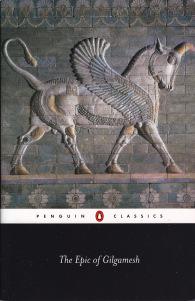 The Epic of Gilgamesh survived only by being buried. Its survival is perhaps less surprising than its discovery after having been lost for many centuries. Reading Andrew George’s translation of the tale reminded me of reading Beowulf. Not only are the two of them hero tales, they are both “sole survivors” in the sense that they define the literature of their respective eras in a way no other text does. Yes, there are other Mesopotamian epics, but Gilgamesh, it was immediately recognized, deals with existential issues in a way that’s thoroughly modern. It is set apart from other ancient literature for that singular achievement. Fear of death leads Gilgamesh to amazing feats even if it only ends in a yad wa-shem. We can feel for Gilgamesh. Although he’s a king, he has to face the demise common to all people, and the language used to express his emotions is touching even today.
The Epic of Gilgamesh survived only by being buried. Its survival is perhaps less surprising than its discovery after having been lost for many centuries. Reading Andrew George’s translation of the tale reminded me of reading Beowulf. Not only are the two of them hero tales, they are both “sole survivors” in the sense that they define the literature of their respective eras in a way no other text does. Yes, there are other Mesopotamian epics, but Gilgamesh, it was immediately recognized, deals with existential issues in a way that’s thoroughly modern. It is set apart from other ancient literature for that singular achievement. Fear of death leads Gilgamesh to amazing feats even if it only ends in a yad wa-shem. We can feel for Gilgamesh. Although he’s a king, he has to face the demise common to all people, and the language used to express his emotions is touching even today.
Beowulf, while singular in a way Gilgamesh isn’t, also leaves the reader wondering what is left of life if not some kind of fame. Beowulf may defeat Grendel, but the dragon mortally wounds him. If his tale had not survived in the back of an old book we wouldn’t be discussing him still today. How narrow that gap between fame and obscurity turns out to be. For the vast majority of us obscurity awaits since few can be recognized by the many. Like Gilgamesh or Beowulf, we know the consciousness inside this head and we feel that somehow we have a purpose. It takes daily life to drive that out of a normal person. The hero, however, refuses to let the odds win. There’s a profound hope here, in these narratives of denying the final fear the final say. In George’s edition the inclusion of other Gilgamesh tales outside the epic texts reinforces that point repeatedly.
Humans are meaning seekers by nature. Some simply accept the illusion of apparent reality and ask for little besides. Others cannot rest knowing that there is more to be understood, or, in the parlance of outmoded means of expression, to be conquered. When life says “Enough,” Gilgamesh refuses to acquiesce until his options run out. For many centuries his story was set to be lost forever. Latter-day restless minds, however, dug in the dirt until something truly extraordinary was discovered there, free for the interpreting. So it is that heroes come from nothingness. Many return to obscurity. Those that are found and venerated experience a resurrection the envy of many a god. Speaking to strangers across millennia is indeed immortality, even for those whose lives must end like all others.
